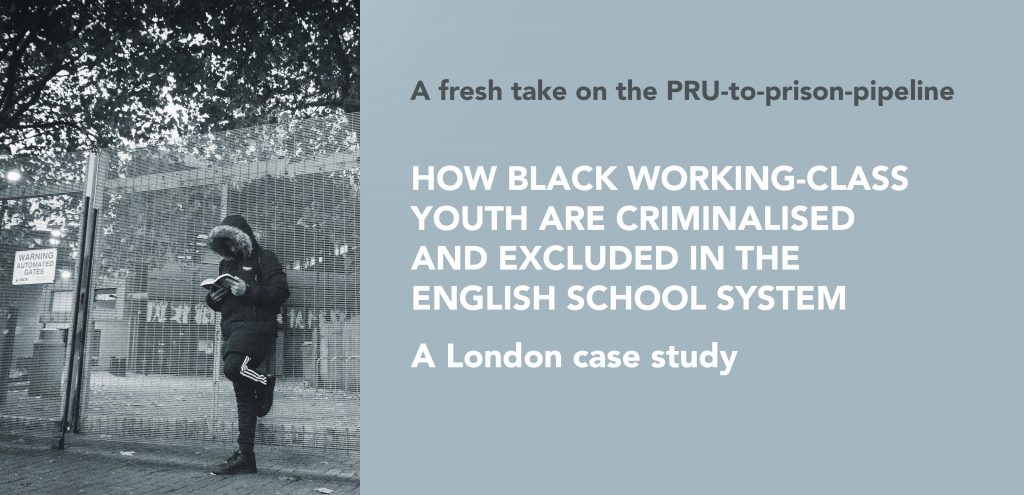The IRR takes a fresh look at the PRU-to-prison pipeline phenomenon in London
Read Now
While a minority of young, multiracial working-class Londoners caught up in serious youth violence are schooled in the Pupil Referral Units (PRUs) and Alternative Provision (AP) that forms part of the ‘PRU-to-prison pipeline’; little is known about how the education system for the excluded came about.
The IRR’s new paper, How Black Working-Class Youth are Criminalised and Excluded in the English School System: A London Case Study, reveals that over the past forty years, exclusion from mainstream school has coincided with systematic ‘educational enclosure’.
In this period, the state has responded to inner-city youth rebellions and political agitation for racial and social justice by depriving working-class communities of education. Consequently, a two-tier education system, with ‘deserving’ and aspirational students in the academy sector and ‘undeserving’ and alienated kids in the PRU and AP sectors has emerged. The ‘undeserving’, steadily cast adrift in education, are not mere anomalies in a system that encourages learning and race-class inclusivity; they represent a system that has been purpose built to segregate. As the paper explains, London is leading this educational trend. The proportion of pupils in PRUs and AP in the capital is almost double the national rate, with young boys of black Caribbean heritage overrepresented in the sector.
This report aims to support important on-going campaigns for education justice, by excavating the specific political conditions that have ushered in regressive reforms. This history has been forgotten and urgently needs retelling at a time when think-tanks and government are in the business of expanding the PRU sector by rebranding it as AP and privatising it through academisation.
Author of the report and IRR researcher Jessica Perera says ‘amidst the Black Lives Matter protests, we have seen increased demands to decolonise the curriculum. At the same time, the coronavirus pandemic has exposed a system which fails working-class students. This paper reminds us that those who have been continually failed are found in PRUs and AP and that their segregation is a damning indictment of a planned education malaise, which has been designed and deployed on a specific section of society with a history of resistance and rebellion.’
IRR Director, Liz Fekete added, ‘With this paper, the IRR challenges the superficial analysis that stigmatises young Black Londoners for knife crime whilst failing to look reality in the eye. Could it be that factors such as austerity, privatisation and educational enclosure have in fact hardwired racial injustice into society?’
Black working-class pupils unfairly excluded in England, thinktank warns https://t.co/cHGO7LQv37
— The Guardian (@guardian) September 28, 2020
Read about the report in The Guardian. The report was also cited in a more recent Guardian analysis on exclusions here.
Download the Report
Jessica Perera is an Associate Researcher at the Institute of Race Relations and author of The London Clearances: Race, Housing and Policing, published in 2019. She is also an Economic and Social Research Council-funded DPhil candidate at the University of Oxford, under the supervision of Professor Danny Dorling.
For Press enquiries contact liam@irr.org.uk


I don’t accept the premises in this introduction at all. Poorly behaved pupils are not agitating for social justice, but turning their back on education in favour of more immediate, if ultimately illusory, gratification through violence and often fast money through drugs. Michaela, which has a high proportion of BAME students, enables many, including some permanently excluded elsewhere, to succeed to an unprecedentd degree.
One of my black students in inner London had a mother who was a nurse, and a father who was not involved with his education and discouraged it. The student’s rebellion took the form of refusing to learn to read. His mother wanted him to do so, his father discouraged him and invited him to join him outside the pub. I was, of course, on his mother’s side. We lost. Allowing his rebellion or, in the school’s case, giving in to it, was clearly not in his long-term interest.
An interesting research summary with much food for thought. The privatisation of schools and performativity are definitely factors at play… Something to consider: If you are a White British pupil premium child with special needs, DfE data suggests you are more likely to be excluded than any other group of pupils. N.b. ADHD pupils x100. We must to better to reduce the number of young people being excluded from our schools, and the government must do more here because many teachers/schools have their backs against the wall…
hi there, I am a child of 1950’s liverpool this system was normal, because of the lack of the race relations act. Nothing new, just more talked about. Teachers could label a black child normally male, and they would be sent to what was then an SEN school, parents never got a say in the decision and some would not challenge it That is part of the problem, lack of challenge, some do and are loud speakers, and get heard. Others keep quiet, never ask and believe the teachers.
I think the diagnosis of this problem shows how out of touch academics are with reality. The reason that students (of any race) commit crimes has nothing to do with “de-colonialising” the curriculum and everything to do with (1) poverty and (2) being in underfunded public schools, and (3) being stuck in an education system that doesn’t understand how to deal with disagreeable or aggressive/excitable children (of any race/gender, though these problems do seem more prevalent in men than women).
If you want to fix the problem, stop giving huge research grants to social justice academics and start investing it in poor communities and the schools that they go to!